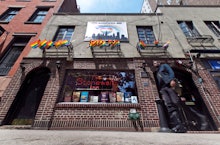5 Places That Should Become LGBT National Monuments Like NYC's Stonewall Inn

There are probably few places more symbolic of the national struggle for gay rights than New York City's historic Stonewall Inn. The Greenwich Village bar, famous for being where gay men and transgender women rioted over anti-gay policing in the late 1960s, was announced Tuesday as a candidate for receiving designation as a national monument.
After federal officials convene a public meeting on May 9 to get feedback on the proposal, and if city officials sign off on it, President Barack Obama could make the designation official before New York City hosts gay pride celebrations in mid June, the Washington Post reported. The Stonewall Inn and a sliver of green space near its entrance are regarded as the birthplace of the country's LGBT liberation movement, which counts marriage equality and HIV/AIDS awareness among its accomplishments in over 50 years.
Here are five other places that could be fitting choices for LGBT monuments:
The U.S. Supreme Court
This hallowed institution has twice decided in favor of marriage equality, which had been part of a decades-long fight for gay and lesbian Americans. In June, the court ruled 5-4 in Obergefell v. Hodges to remove barriers to marriage for gay and lesbian couples nationwide. In 2013, the court's justices ruled in United States v. Windsor that same-sex couples were entitled to the same benefits as any married couple, ending a long standoff over the Defense of Marriage Act that barred government recognition of same-sex unions. The court also declined to hear California's Prop 8 ban on same-sex marriage, effectively opening marriage to gay and lesbian couples in the Golden State.
The office of Kentucky Clerk Kim Davis
As odd a choice as the Rowan County, Kentucky, clerk's office might seem, it's arguably the site of a swift victory for defending marriage equality. After the Supreme Court validated marriage for same-sex couples nationwide, Kim Davis announced that she would turn away gay couples seeking marriage licenses because of her deeply held religious opposition to same-sex unions. But couples from across the state defiantly lined up at Davis' office to file for licenses. A federal judge later ordered Davis to issue the licenses and jailed her when she refused in September. Deputy clerks are now issuing licenses to those who come through Davis' doors.
LGBT Youth Centers
Life is often tough for gay, lesbian and transgender youth. Nearly 40% of all homeless youth are LGBT, according to the True Colors Fund, a New York-based advocacy group — many of who were left homeless due to family conflicts relating to their sexuality. These community centers often stand in as families and mentors for these youth, who come in the doors needing shelter, financial assistance, health care and other essentials. The San Diego LGBT Community Center has the distinction of being one of the country's largest.
The Food & Drug Administration Building
As the HIV and AIDS epidemic ravaged nation's gay communities in the 1980s, a group of activists organized a protest that shut down the Food and Drug Administration offices near Washington, D.C., for a full day. ACT UP, the gay activist group, staged the protest on Oct. 11, 1988, to call out the FDA for dragging its feet on experimental drugs to fight AIDS. Nearly 30 years later, the nation is more aware of the variety of HIV drugs and prevention measures than ever before.
Harvey Milk's Castro Camera
The late Harvey Milk ran two unsuccessful campaigns for San Francisco Broad of Supervisors, before winning in a third attempt to become the nation's first out gay person elected to public office. Milk's camera shop, Castro Camera, served as a base for his campaigns and political activism around LGBT issues, access to childcare and civilian police oversight. The store operated in the heart of the Castro district, a historic LGBT neighborhood in San Francisco, and is now a store owned by the Human Rights Campaign, a national LGBT civil rights group. Before his assassination in 1978, Milk inspired a generation of activists to become politically engaged.